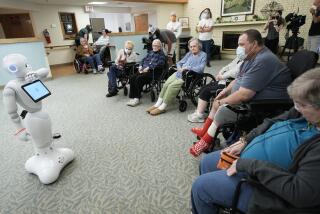Offering Holiday Care to the Caregivers
- Share via
Holiday blues can overtake anyone, but they are a special challenge to individuals and families struggling to take care of an ill or disabled loved one at home.
Eighty percent of long-term care in the U.S. is provided by families and friends. The Los Angeles Caregiver Resource Center is one of 11 in the state that supports those taking care of family members with brain impairment such as dementia or stroke. It provides caregivers with short-term relief from the demands of providing 24-hour care.
Shawn Herz, family services director for the L.A. center, talked with JANE SPILLER.
*
Around the holidays we get a lot of calls from caregivers and others who are really hurting, asking how to reap some joy from the holidays. The expressed concern is often for a good meal, but it isn’t really about the meal, it’s about fellowship and sharing, feeling they are part of the community.
Many caregivers become increasingly isolated and dread the holidays, constantly reminded how wonderful it would be to be part of a happy, healthy, loving family. On top of the stress, they often feel shame about the condition of their loved one--a husband with incontinence or often severe behavior problems.
How can individuals have a positive holiday experience in the face of adversity and despair? Some suggestions:
* Music can work wonders. One client called her local high school and hired a flutist to come play while she and her spouse, who suffers from Parkinson’s, and the next-door neighbors enjoyed dessert and coffee. She said having this young woman in her home playing such beautiful music was a magic elixir.
* Being touched, having personal attention can be comforting. Massage can be wonderful. So can a manicure or pedicure.
* Some foods are comfort foods. Bake Mom’s apple pie, or get together with friends to make gingerbread. Many services will deliver a meal to the homebound and stay a while to visit. The Salvation Army is known to deliver a generous meal and fellowship.
* Don’t ignore the curative powers of human contact. Reach out. Telephone someone you haven’t spoken to in a long time.
Of course, the best prescription for depression for all of us is to do something for someone else; it gets you out of your own slump and self-absorption. What can touch someone the most is when a friend comes over with a big pot of homemade soup and says “Happy holidays, I just wanted to make sure you’re OK.”


